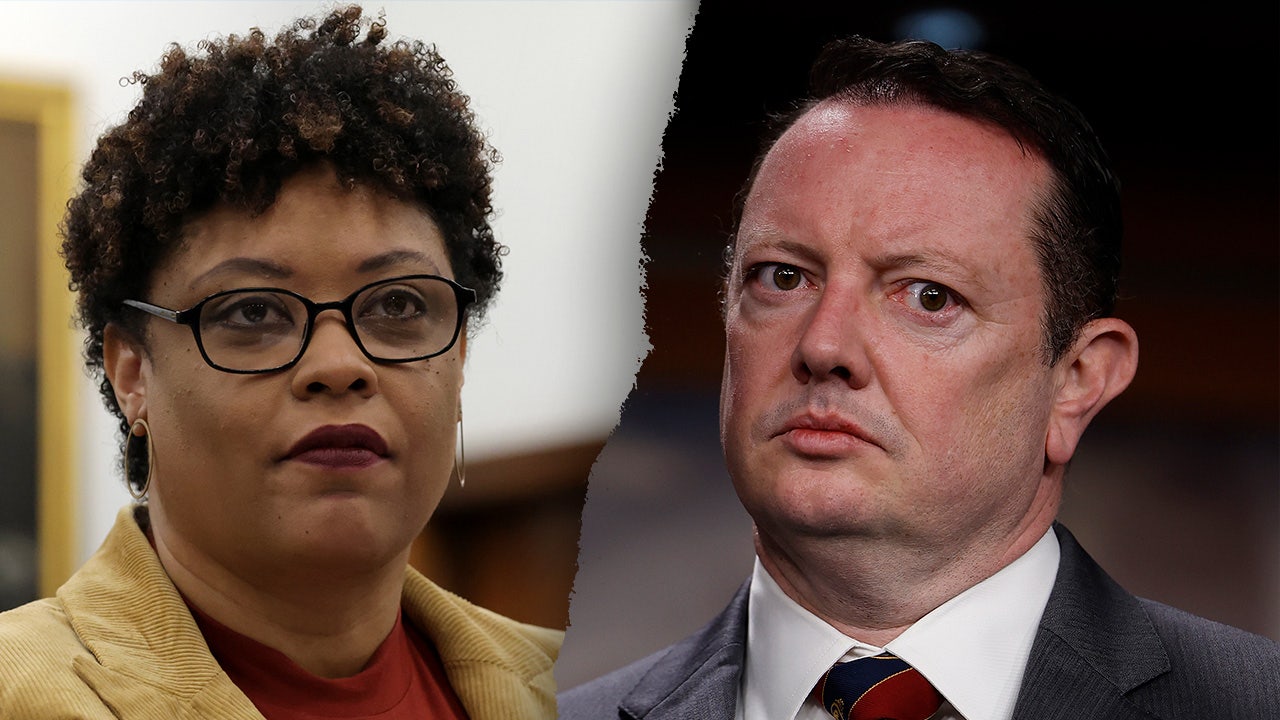Business
Elizabeth Holmes Must Report to Prison on May 30 and Pay Restitution

The Latest
Elizabeth Holmes, the disgraced founder of the failed blood testing start-up Theranos, who was convicted last year on charges that she defrauded investors of more than $100 million, has lost her latest bid to stay out of prison while she appeals her conviction.
Ms. Holmes, whose case cast a harsh light on Silicon Valley’s culture of hubris, must report to prison on May 30, a judge ruled after the U.S. Court of Appeals for the Ninth Circuit rejected her attempt on Tuesday to remain free on bail.
Ms. Holmes and her top lieutenant at Theranos, Ramesh Balwani, who was found guilty of fraud in a separate trial and who began serving his prison sentence last month, were also ordered to pay $452 million in restitution to victims of the company’s fraud.
Of that total, the judge, Edward J. Davila of the U.S. District Court for the Northern District of California, who oversaw both trials, determined that Ms. Holmes and Mr. Balwani should pay $125 million to the media mogul Rupert Murdoch, who invested in Theranos. Walgreens and Safeway, which had entered into business deals with the company, were also identified as victims for the purposes of restitution.
Why It Matters: Ms. Holmes’s conviction was the end of an era.
Theranos raised nearly a billion dollars from investors for technology that the company said could test for a wide range of illnesses with just a few drops of a patient’s blood. After those claims turned out to be false, both Ms. Holmes and Mr. Balwani were accused of defrauding investors.
Their convictions and sentencing — 11 years for Ms. Holmes, 13 for Mr. Balwani — has contributed to the feeling in Silicon Valley that the era of the “fake it till you make it” approach may be winding down. Ms. Holmes, who dropped out of Stanford to start the company, hit a paper net worth of $4.5 billion and had celebrity backers. Her precipitous downfall has been documented extensively in television shows, podcasts and documentaries.
Background: A last-minute effort to stay out of prison.
Ms. Holmes is appealing her conviction, a process that delayed her prison start date, which was originally set for April 27. Last month, Judge Davila denied a last-minute request from Ms. Holmes to remain free pending her appeal.
Ms. Holmes was convicted last year on four felony counts of defrauding investors.
Mr. Balwani, who is also known as Sunny, was Ms. Holmes’s close professional associate and one-time romantic partner. He was convicted in a trial last year on 10 counts of wire fraud and two counts of conspiracy to commit wire fraud, a verdict that was more severe than that of Ms. Holmes. His legal team has filed an appeal of his conviction.
What’s Next: Ms. Holmes will head to prison.
Ms. Holmes is to surrender to authorities after the Memorial Day weekend. She had originally been ordered to report to Federal Prison Camp in Bryan, Texas. She has been living in California with her partner, Billy Evans, and their two young children.

Business
Las Vegas' Mirage Resort to close after 34-year run. Volcano to go dormant

Once hailed as “Las Vegas’ first 21 Century resort,” The Mirage Hotel & Casino confirmed Wednesday that its iconic volcano outside of its front entrance is going dormant less than a quarter of a century into the new millennium.
Owner Hard Rock International announced the hotel will cease operations on July 17, with bookings being accepted until July 14. The iconic resort — sporting a jungle-fantasy theme —was perhaps best known for its exploding 54-foot man-made volcano, magicians Siegfried and Roy, and its white tigers and dolphins.
“We’d like to thank the Las Vegas community and team members for warmly welcoming Hard Rock after enjoying 34 years at The Mirage,” said Jim Allen, Chairman of Hard Rock International in a statement.
The resort is expected to be redeveloped into the Hard Rock Hotel & Casino and Guitar Hotel Las Vegas, with the volcano giving way to a nearly 700-foot guitar-shaped hotel. The project is expected to open in spring 2027. A similar 638-room hotel stands in Hollywood, Fla.
The Associated Press reported that more than 3,000 employees will be laid off. Hard Rock acknowledged it would pay roughly $80 million in severance packages for union and nonunion labor.
The Culinary and Bartenders Union accounts for about 1,700 Mirage workers. It announced Wednesday that its workers have two options.
The first was a severance package of $2,000 for every year of service plus six months of pension and health benefits. The second option gives employees a lesser, undisclosed amount while maintaining seniority rights for the duration of the property’s closure along with 36 months of recall rights for jobs at the new hotel.
“Culinary Union members at The Mirage have a strong union contract, ensuring that workers are protected, even as the property closes its doors entirely for three years from July 2024 – May 2027,” said Ted Pappageorge, Culinary Union secretary-treasurer, in a statement Wednesday.
The new hotel is projected to employ nearly 7,000 employees, according to Hard Rock management, while 2,500 construction jobs are expected during the rebuilding process.
Hard Rock said that all reservations beyond July 14 would be canceled and that guests should contact the guest services department or booking agency for a refund.
The Mirage’s closure is the second on the strip this year.
In April, the 66-year-old Tropicana closed its doors to make way for a 30,000-seat stadium that is expected to serve as the home of the Oakland A’s.
The Mirage’s opening by casino tycoon Stephen A. Wynn in 1989 was hailed as the ushering of a new era of resorts. It was the first strip hotel to open since the MGM Grand in 1973.
Wynn shelled out $600 million, then the most expensive casino project, for the sprawling 103-acre property.
The Mirage was the first fully integrated hotel, according to Alan Feldman, a Distinguished Fellow at UNLV’s International Gaming Institute.
Integration meant operating and treating all facets of the resort, including casino, food and beverage, retail, entertainment and convention space, with equal importance, according to Feldman, who rose to become an executive with the Mirage and stayed from 1989 to 2019.
Feldman said hotel owners previously cared first about the casino and “everything else was last.”
“They gave away entertainment, food and rooms as long as someone came and played,” said Feldman. “The Mirage was the first to believe you could actually make money in these areas if you invested enough.”
Its glistening 30-story white-and-gold towers were said to make neighboring Caesars Palace look “retiring by comparison.” Traffic occasionally backed up on the strip as engineers tested gas-flared flames 40 feet into the air every few minutes.
“People just got out of the cars and went over to see what was going on,” one limousine driver said at the time.
The hotel included a 20,000-gallon fish tank at its reception desk and 3,049 rooms.
Its animals — and its white tiger habitat — brought the resort fame and infamy, including in 2003 when a tiger critically injured magician Roy Horn.
The Mirage’s opening kicked off a resort building and remodeling spree that included the debut of the Circus Circus’ Excalibur in June 1990, the $250-million renovation of Caesars Palace and the opening of Treasure Island in 1994.
Business
Sony warns tech companies: Don't use our music to train your AI

Sony Music Group is sending letters to 700 artificial intelligence developers and music streaming services warning them to not use its artists’ music to train generative AI tools without its permission.
The company — one of the three largest recorded music firms — said it is explicitly opting out of the use of its music for training or developing AI models through text or data mining or web scraping as it relates to lyrics, audio recordings, artwork, musical compositions and images. Sony Music Group artists include Celine Dion, Doja Cat and Harry Styles.
“We support artists and songwriters taking the lead in embracing new technologies in support of their art,” Sony Music Group said in a statement on its website Thursday. “Evolutions in technology have frequently shifted the course of creative industries. … However, that innovation must ensure that songwriters’ and recording artists’ rights, including copyrights, are respected.”
The letters were sent to companies including San Francisco-based ChatGPT creator OpenAI and Mountain View-based search giant Google, according to a person familiar with the matter who was not authorized to speak publicly. OpenAI and Google did not immediately respond to requests for comment.
The move comes as the entertainment industry is grappling with rapid innovations in artificial intelligence technology. Writers and actors raised concerns last summer about whether leaving AI unchecked could threaten their livelihoods. Meanwhile, some creatives have marveled at the advancements that could allow them to pursue bold ideas with tight budgets.
This year, OpenAI unveiled its text-to-video tool Sora, which was used to create a four-minute music video for music artist Washed Out. The director of the video told The Times that Sora helped him depict multiple locations and visual effects that he otherwise couldn’t have.
But AI can also create chaos. Celebrities have dealt with “deep fakes” — false videos or audio depicting a celebrity endorsing certain brands or activities. To help protect their clients against unauthorized use of their voice and likeness, Century City-based Creative Artists Agency is helping talent create their own digital doubles.
On Thursday, two New York voice-over actors sued Berkeley-based AI voice generator business Lovo for unauthorized use of their voices. Lovo did not immediately return a request for comment. The lawsuit was filed in U.S. District Court for the Southern District of New York.
Some people in the entertainment industry have said they would like the AI companies to be more transparent about how they are training their tools and whether they have the appropriate copyright permissions.
OpenAI has said its large language models, including those that power ChatGPT, are developed through information available publicly on the internet, material acquired through licenses with third parties and information its users and “human trainers” provide.
The company said in a blog post that it believes training AI models on publicly available materials on the internet is “fair use.”
But some media outlets, including the New York Times, have sued OpenAI. The newspaper raised alarms about how its stories are being used by the tech company.
In Sony Music Group’s letters to AI businesses, the company said it has reason to believe its content may have been used to train, develop or commercialize artificial intelligence systems without its permission, according to a copy obtained by the Times. Sony Music Group asked the tech companies to provide information regarding that use and why it was necessary.
Sony Music Group, owned by Tokyo-based electronics giant Sony Corp., also wants music streaming providers to add language in its terms of service saying that third parties are not allowed to mine and train using Sony Music Group content, the person familiar with the matter said.
Business
A woman was dragged by a self-driving Cruise taxi in San Francisco. The company is paying her millions

General Motors’ autonomous car company, Cruise, has reportedly agreed to pay an $8-million to $12-million settlement to a woman who was hospitalized after getting dragged along the pavement by a self-driving taxi in San Francisco last year.
The woman, a pedestrian, was struck by a hit-and-run vehicle at 5th and Market streets and thrown into the path of Cruise’s self-driving car, which pinned her underneath, according to Cruise and authorities. The car dragged her about 20 feet as it tried to pull out of the roadway before coming to a stop.
She sustained “multiple traumatic injuries” and was treated at the scene before being hospitalized.
It’s unclear when the settlement was reached or the exact amount, sources familiar with the situation told Fortune and Bloomberg. The condition of the woman, whose name was not released by authorities, is unknown, but a representative of Zuckerberg San Francisco General Hospital told Fortune that she had been discharged.
Cruise initially said that its self-driving car “braked aggressively to minimize impact” but later said the vehicle’s software made a mistake in registering where it hit the woman. The car tried to pull over but continued driving 7 mph for 20 feet with the woman still under the vehicle.
“The hearts of all Cruise employees continue to be with the pedestrian, and we hope for her continued recovery,” Cruise said in a statement.
Cruise halted its driverless operations after its autonomous taxi license was suspended by California’s Department of Motor Vehicles. The company was also accused of lying to investigators and withholding footage of the car crash.
Cruise said this week that it would start testing robotaxis in Arizona with a “safety driver” behind the wheel in case a human needs to take control of the vehicle, according to a company news release.
“Safety is the defining principle for everything we do and continues to guide our progress towards resuming driverless operations,” according to the release.
-

 Politics1 week ago
Politics1 week agoRFK Jr said a worm ate part of his brain and died in his head
-

 World1 week ago
World1 week agoPentagon chief confirms US pause on weapons shipment to Israel
-

 News1 week ago
News1 week agoStudents and civil rights groups blast police response to campus protests
-

 World1 week ago
World1 week agoConvicted MEP's expense claims must be published: EU court
-

 Politics1 week ago
Politics1 week agoCalifornia Gov Gavin Newsom roasted over video promoting state's ‘record’ tourism: ‘Smoke and mirrors’
-

 Politics1 week ago
Politics1 week agoOhio AG defends letter warning 'woke' masked anti-Israel protesters they face prison time: 'We have a society'
-

 Politics1 week ago
Politics1 week agoBiden’s decision to pull Israel weapons shipment kept quiet until after Holocaust remembrance address: report
-

 News1 week ago
News1 week agoNine Things We Learned From TikTok’s Lawsuit Against The US Government















